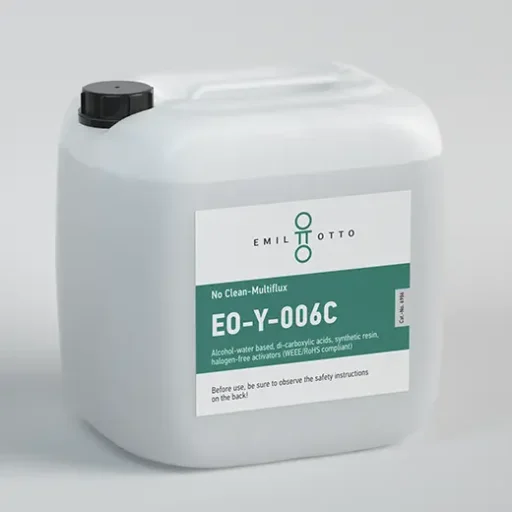No Clean-Flux, alcohol-based, partially aqueous
Di-carboxylic acids, low VOC, halogen-free activated, with synthetic resin, rosin-free (WEEE/RoHS compliant)
Type ISO-9454: 2231 (2.2.3.A) DIN EN 61190-1-1 (IEC ORL0)

| Appearance: | colourless, transparent liquid |
| Hazardous goods: | Yes |
| VOC: | 60 % |
| Solids content: | 4.0 wt.-% |
| Acid number: | 32 – 37 mg KOH/g |
| Halogen-free: | Yes |
| Resiny: | Yes |
| Density at 20 °C: | 0.86 – 0.88 g/ml |
| Activators: | di-carboxylic acids, synthetic resin |
| Solvents: | alcohol- / partial water-based |
| Flash point: | 20 °C |
| Available as concentrate: | No |
| Durability: | 12 months |
EO-Y-006C is universally suitable for the wave and selective soldering of circuit boards and contains organic, halogen-free, activating additives formulated with a small amount of synthetic resin. This flux was developed in a combination with leaded and lead-free solders, coordinated especially to the thermal requirements of the soldering process.
EO-Y-006C contains special alcoholic additives for the stabilization and improvement of the drying time in comparison with conventional water- or partially water-based fluxes.
Recommendations for the processing of this flux:
This flux is very versatile in use and OSP-compatible. Good results are achieved with manual, wave and selective soldering, dip soldering as well as for strand tinning. The generally applicable rule, to basically select as little of the applied flux as possible, is also valid for this product.
Foam fluxes: Not recommended
Spray fluxes: With the possibility of dosing the amount of fluxing agent, first set to 30 – 40 ml/min., observe the even distribution of flux on the circuit board (if necessary test with heat-sensitive paper) and then adjust to the optimal amount.
Pre-heating: With “simple” circuit boards a pre-heating temperature of 80 – 110 °C is recommended on the top side of the circuit board, with “more complex” boards a temperature of 100 – 130 °C is recommended. The operation can be carried out both in solder systems containing leaded as well as lead-free solder systems.